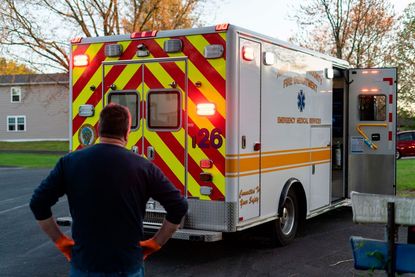True death toll of coronavirus pandemic in the U.S. could be 'one and a half times higher,' new research shows


An analysis of federal data conducted by a research team led by the Yale School of Public Health found the United States recorded an estimated 37,100 excess deaths during the coronavirus pandemic throughout March and the first two weeks of April. That's nearly 13,500 more than are attributed to COVID-19 during that same period, The Washington Post reports.
The country passed 64,000 coronavirus deaths Friday, but Dan Weinberger, a Yale professor of epidemiology who led the analysis, said his team's estimates indicate the true toll could be "in the range of one and a half times higher." The analysis is based on death certificates compiled by states and sent to the National Center for Health Statistics, which often takes weeks to count a death, leading to a backlog of fatalities that eventually add to the toll at a later date.
While the estimates likely include deaths that were a direct result of unconfirmed COVID-19 cases, that's not necessarily the cause behind every excess fatality. Instead, people may have avoided going to hospitals when they otherwise would have for unrelated illnesses, or were unable to get proper treatment for other maladies because of overwhelmed health care systems. The one thing that Weinberg wants to make clear is that, either way, "people need to be aware that the data they're seeing on deaths is very incomplete." Read more at The Washington Post.
Subscribe to The Week
Escape your echo chamber. Get the facts behind the news, plus analysis from multiple perspectives.

Sign up for The Week's Free Newsletters
From our morning news briefing to a weekly Good News Newsletter, get the best of The Week delivered directly to your inbox.
From our morning news briefing to a weekly Good News Newsletter, get the best of The Week delivered directly to your inbox.
Create an account with the same email registered to your subscription to unlock access.
Sign up for Today's Best Articles in your inbox
A free daily email with the biggest news stories of the day – and the best features from TheWeek.com
Tim is a staff writer at The Week and has contributed to Bedford and Bowery and The New York Transatlantic. He is a graduate of Occidental College and NYU's journalism school. Tim enjoys writing about baseball, Europe, and extinct megafauna. He lives in New York City.
-
 Antony Gormley's Time Horizon – a 'judgmental army' of 100 cast-iron men
Antony Gormley's Time Horizon – a 'judgmental army' of 100 cast-iron menThe Week Recommends Sculptures are 'everymen questioning the privilege of their surroundings' at the Norfolk stately home
By Adrienne Wyper, The Week UK Published
-
 'King's horses take free rein through London'
'King's horses take free rein through London'Today's Newspapers A roundup of the headlines from the US front pages
By The Week Staff Published
-
 Is pop music now too reliant on gossip?
Is pop music now too reliant on gossip?Talking Point Taylor Swift's new album has prompted a flurry of speculation over who she is referring to in her songs
By Richard Windsor, The Week UK Published
-
 Puffed rice and yoga: inside the collapsed tunnel where Indian workers await rescue
Puffed rice and yoga: inside the collapsed tunnel where Indian workers await rescueSpeed Read Workers trapped in collapsed tunnel are suffering from dysentery and anxiety over their rescue
By Sorcha Bradley, The Week UK Published
-
 More than 2,000 dead following massive earthquake in Morocco
More than 2,000 dead following massive earthquake in MoroccoSpeed Read
By Justin Klawans Published
-
 Mexico's next president will almost certainly be its 1st female president
Mexico's next president will almost certainly be its 1st female presidentSpeed Read
By Peter Weber Published
-
 North Korea's Kim to visit Putin in eastern Russia to discuss arms sales for Ukraine war, U.S. says
North Korea's Kim to visit Putin in eastern Russia to discuss arms sales for Ukraine war, U.S. saysSpeed Read
By Peter Weber Published
-
 Gabon's military leader sworn in following coup in latest African uprising
Gabon's military leader sworn in following coup in latest African uprisingSpeed Read
By Justin Klawans Published
-
 Nobody seems surprised Wagner's Prigozhin died under suspicious circumstances
Nobody seems surprised Wagner's Prigozhin died under suspicious circumstancesSpeed Read
By Peter Weber Published
-
 Western mountain climbers allegedly left Pakistani porter to die on K2
Western mountain climbers allegedly left Pakistani porter to die on K2Speed Read
By Justin Klawans Published
-
 'Circular saw blades' divide controversial Rio Grande buoys installed by Texas governor
'Circular saw blades' divide controversial Rio Grande buoys installed by Texas governorSpeed Read
By Peter Weber Published